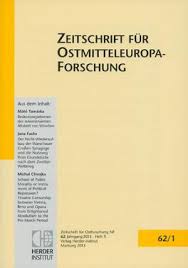Alt-Livland zwischen römischen Kolonisten und jüdischen Exilanten. Genealogische Fiktionen in der Historiografie des 17. Jahrhunderts
Roman Colonists and Jewish Exiles in Old Livonia? Genealogical Fictions in the Historiography of the 17th Century
Author(s): Stefan DoneckerSubject(s): Jewish studies, Social history, 17th Century
Published by: Verlag Herder-Institut
Keywords: Roman Colonists; Jewish Exiles; Old Livonia; Genealogical Fictions; Historiography of the 17th Century;
Summary/Abstract: During the approximately 150 years between the mid-16th century and the early 18th century, Livonia, as the main battleground in the wars for supremacy in the Baltic area, gained the attention of the erudite elites of Europe. During these years, historiographers and ethnographers attempted to reconstruct Livonia’s earliest history and determine the origins of its indigenous inhabitants. According to the genealogical paradigm of the time, an inquiry into the ancestry of a given people allowed scholars to comprehend its national character and evaluate its virtues and flaws. Compared to other European genealogical traditions of the same period, the origines Livonorum have to be regarded as a very unusual case: In most instances, scholars constructed a genealogy for the dynasty, realm or city that they, themselves, belonged or felt allegiance to. In Livonia, however, genealogical inquiry was not a question of self-perception, as it was German and Swedish scholars who speculated on the origins of the Estonian and Latvian peasantry. The efforts to determine the origins of Livonia’s indigenous population resulted in a great variety of conflicting, and often confusing, hypotheses. All in all, roughly seventy tribes were nominated as possible ancestors, and the scholars involved failed to reach a consensus. One of the most popular theories claimed that Estonians and Latvians descended from exiled Roman noblemen who had established a colony on the Baltic Sea. Other scholars, however, preferred a Jewish origin and claimed that Estonians and Latvians descended from the legendary Lost Tribes of Israel, or from Jewish refugees who fled the destruction of Jerusalem. Both theories seem bizarre from a modern point of view – but according the genealogical methodology of the early modern period, they were absolutely legitimate and reasonable hypotheses. Furthermore, both the alleged Roman and the Jewish ancestry of the Livonian peasants could be instrumentalised in the sociopolitical debates of the 17th century: If Latvians and Estonians were derived from prestigious Roman noblemen, it would have been absolutely inappropriate to force them into humiliating serfdom. A Jewish origin, on the other hand, would have confirmed the strict social stratification of early modern Livonia, and according to the prevalent anti-Semitic stereotypes, the offspring of Jewish exiles could hardly claim better treatment. Formally, the origines Livonorum were an antiquarian debate dealing with the most distant past, but implicitly, the theories on Estonian and Latvian ancestors allowed early modern scholars to voice their opinion on contemporary issues.
Journal: Zeitschrift für Ostmitteleuropa-Forschung
- Issue Year: 60/2011
- Issue No: 2
- Page Range: 210-231
- Page Count: 22
- Language: German

